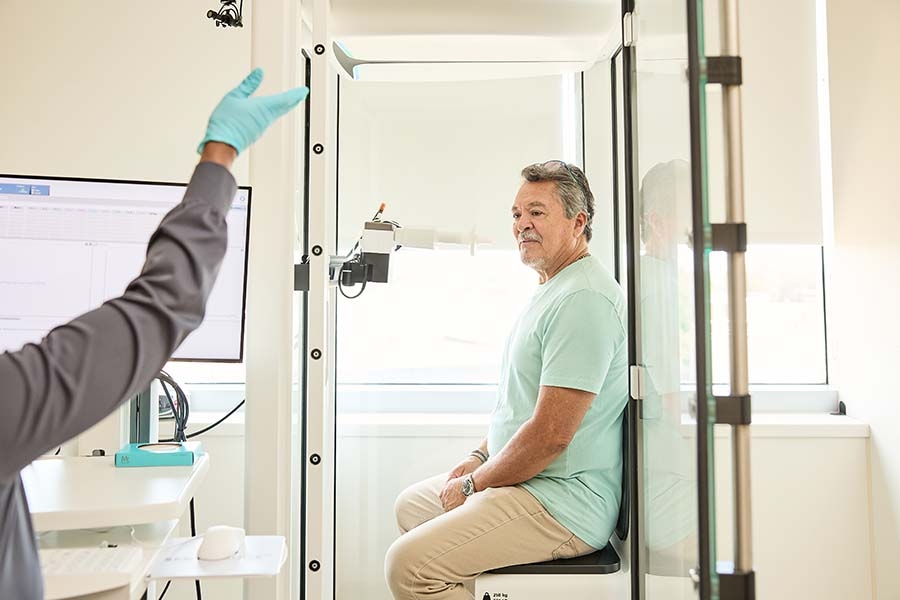If you've been diagnosed with idiopathic pulmonary fibrosis (IPF), it's good to know: You have an army of supporters out there. I am one of them. I personally know how shocking and devastating a diagnosis of IPF is to a patient and their family.
Let me tell you my story.
In 2004, I lost my dad, Ron Wescoe, to IPF — a chronic condition that scars the lungs. Over time, the scarred tissue in his lungs became thick and stiff, which made it difficult for him to breathe. Some forms of pulmonary fibrosis are linked to medications, environmental exposures, or autoimmune conditions, for instance. But that wasn’t the case with my dad. His pulmonary fibrosis was considered idiopathic, which means there was no known cause for his disease.
About three or four years before his diagnosis, my dad began to experience symptoms of IPF, including coughing and shortness of breath. Neither he nor his primary care physician knew why. IPF can be difficult to diagnose. My dad was prescribed inhalers in the hopes they would help his breathing, but they didn’t. Eventually he was referred to a pulmonologist, who provided a proper diagnosis. But my dad’s condition had rapidly progressed by then — he was really struggling to breathe — and he passed the following year. If he had been diagnosed sooner, he may have been able to get the treatment and medical attention that he needed to manage his IPF.
Creating goodness from tragedy
Our family had never heard of IPF when my dad was diagnosed. And I didn’t want others to go through what we went through — we didn’t know where to turn for support and guidance. There weren’t many resources available at that time. So after my dad’s passing, I founded the Wescoe Foundation for Pulmonary Fibrosis. Our mission is to provide support, education, advocacy, and resources to help patients and their families living with IPF sustain the highest quality of life. Our foundation held our first awareness event in 2005, and we became a nonprofit in 2011.
By 2013, we realized we wanted to touch even more lives in the IPF community. So we partnered with the Temple Lung Center and later started our first IPF support group. Temple has always welcomed and supported us. Shortly after my dad’s diagnosis, his local pulmonologist referred him to Temple. Honestly, it was the best thing that could have happened for us. Temple has one of the best lung centers in the nation, and their pulmonologists are some of the best at treating IPF. We were very thankful to be in such great hands.
After confirming my dad’s diagnosis, Temple’s specialists helped him begin a treatment plan that improved the quality of his life, including medications to help manage his symptoms. Few treatment options existed for IPF in 2003, but experts at Temple’s Interstitial Lung Disease (ILD) Program (IPF is a type of ILD) now have drugs, such as nintedanib and pirfenidone, that can help slow the course of IPF.
In addition to treating my dad’s condition, Temple offered a support group for him and our family. What’s more, Temple prescribed pulmonary rehabilitation for him. The rehab was designed to help him live stronger with IPF while waiting for a lung transplant so that he would be strong enough for the surgery.
Whether to pursue a lung transplant is a personal decision. But establishing a relationship with a transplant center like Temple early on is crucial if you choose to pursue this option.
My dad chose to move forward with transplant surgery, and Temple’s team helped us understand every step in the process. They treated my dad with the utmost dignity and respect, and they boosted his spirits when he was on the transplant waiting list. Sadly, my dad’s disease progressed quickly and he passed just 11 months after his diagnosis, before he could receive a transplant.
Now, through a collaborative working relationship with Temple, we make sure other patients with IPF and their families are supported too. We offer more than 20 support groups online and throughout the tri-state area, along with educational seminars co-hosted by Temple Lung Center.
Sharing support and knowledge
It has been my great privilege to help people navigate life with IPF, especially those who are new to the condition. Here are a few of the most common questions I hear from people newly diagnosed with IPF.
Where do I start?
An IPF diagnosis can be overwhelming. Here is what I recommend to patients with IPF:
Get the support you need. It’s normal to feel fear and uncertainty in the face of an unpredictable condition. But you are not alone, and there is hope. Through a support group, you can build community, share your journey, and learn about IPF from others. Find support groups in Pennsylvania, New Jersey, or Delaware.
It’s also important to have family or friends who will share your IPF journey with you. Consider asking them to do things like attend a support group with you or go to medical appointments with you.
Care partners — a term we often use to refer to IPF caregivers — are essential to helping you maintain your best quality of life. Make sure your care partners have access to this resource too. Use the Carebook to help create a personal plan for managing your IPF.
Empower yourself. In conjunction with the Temple Lung Center, we provide a free IPF Carebook through our foundation. It will help you begin to navigate this condition. To receive a copy, send me an email at [email protected], or call me at 484-553-6340.
Also, attend educational seminars. Ask questions. The more you learn about IPF, the easier it may be to have conversations with your pulmonologist about your treatment options and to decide which treatments will be best for you.
Care for your emotional health. For many people, practicing mindfulness — living in the moment — can help them cope with the emotional side of a serious, progressive illness. It can reduce stress, anxiety, and depression. Mindfulness can be as simple as paying attention to the weather as you walk to the mailbox or really focusing on a task at hand, like planting some flowers or cleaning out a closet.
Can IPF be cured?
We don’t yet have a cure for IPF, but there are good treatments that can help you manage your condition. For example:
- Medications can be prescribed to help slow the progression of IPF.
- Supplemental oxygen therapy can help you manage shortness of breath.
- Pulmonary rehabilitation can improve your quality of life through exercise, education, and other support. As I mentioned, this is one of the services that helped my dad.
- Palliative care can help provide symptom relief and emotional support. Unlike hospice, which focuses on the final months of life, palliative care is available at any stage of your illness and while you’re still getting curative treatments.
- Clinical trials can explore emerging therapies at every stage of IPF that may help you better manage your disease and help us to one day find a cure. Your pulmonologist can tell you about clinical trials you may be eligible for.
Will I need a lung transplant?
Since IPF is a progressive disease, lung transplants are often eventually recommended for many people with IPF. That’s why it’s important to begin your IPF journey at a center that has a transplant program, like Temple.
Most patients at Temple when diagnosed with IPF will also be evaluated for a lung transplant. Your doctor can tell you more about whether this treatment might be appropriate for you. If so, we are lucky to have Temple’s renowned Lung Transplant Program in our area. They perform more lung transplants than any other hospital in the country each year1, and they have the best outcomes in the region1.
There’s a lot to learn before lung transplantation. That’s why our foundation created a lung transplant mentorship program. It can help potential lung transplant candidates understand what to expect.
How can I talk to my family about IPF?
All families have their own communication styles. And that’s OK. You may want to explain that IPF is a rare lung condition with no known cause or cure. But at the same time, do your best to reassure them that hope, resources, and support exist.
It’s OK to feel scared and to talk about that fear. Try to do your best to be there for each other. Family support is crucial with IPF, especially if you’re on the list for a lung transplant. You will need to rely on your care partners for practical things, like keeping track of your medical appointments, cooking meals for you, or picking up your medications. But their emotional encouragement is also necessary for those times when you might feel stressed or worried about your condition and your future.
You are not alone
I started this by saying that you have an army of supporters out there. It’s true. Other people who are living with and managing their IPF can be great resources. So can your care partners and doctors — and organizations like the Wescoe Foundation and the Temple Lung Center.
Together they can surround you with the support you need to live your best with IPF.
If you’ve been diagnosed with IPF, schedule an appointment at the Temple Lung Center or call 800-TEMPLE-MED (800-836-7536) today.
Helpful Resources
Looking for more information?

